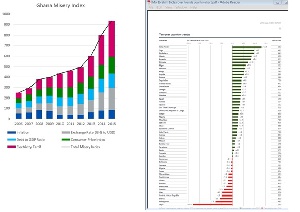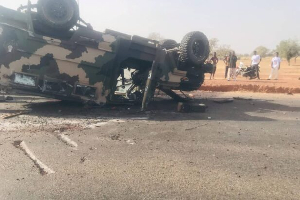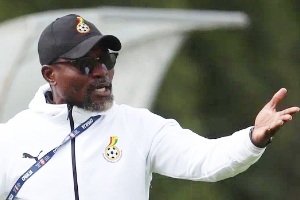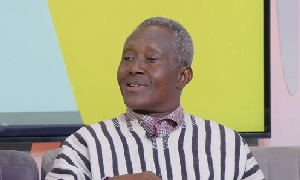The past eight years have been a disaster for the people of Ghana. Governance standards have slipped and the economy has struggled, making life more difficult for every Ghanaian. Our country, once held up as the gold standard, has fallen markedly behind our peers.
The government has mismanaged the economy and taken on loan after loan, increasing Ghana’s debt burden to an unsustainable level and mortgaging the country’s future. The result is slowed business growth, the loss of jobs, and higher prices of everything from bread to medicine.
A growing number of expert reports from African and European nonpartisan sources are showing with hard numbers what ordinary Ghanaians already know: that the NDC has done a terrible job governing this country, that their mismanagement, incompetence, and corruption has brought down a once rising economy.
Failure of governance
According to the 2016 Mo Ibrahim Index report, “A Decade of African Governance,” Ghana has had the most significant decline in good governance over the past decade of any country that is not currently experiencing conflict and instability. Over the past ten years, Ghana’s overall score on the index has declined by 2.1 points, which i s the eighth largest deterioration on the continent.
With the exception of Mauritania, which is struggling to contain terrorism, all of the countries that have declined equally or more than Ghana – Libya, Madagascar, Eritrea, Central African Republic, Mali, the Gambia, and Burundi – are classified by the World Bank as Fragile and Conflict-Affected States. The Mo Ibrahim Foundation notes this trend as “concerning,” pointing to the “potential fragility” of Ghana’s previously strong democracy.
Multiple reports also indicate that Ghanaians are increasingly frustrated with government corruption. In a December 2015 Transparency International Report, Ghana had the second highest percentage citizens among African countries saying they felt corruption has increased, with 76% Ghanaians citing the troubling trend. The third highest was Nigeria, with 75%.
According to Afrobarometer surveys conducted several times over the past ten years, Ghana saw one of the largest declines on the continent in public satisfaction with how the government is handling fighting corruption, dropping 51.1 points over the past ten years. The perception of the corruption of elected officials has also increased sharply: in 2014, 83% of Ghanaians perceived at least some presidential officials to be corrupt, compared to 56% in 2005.
According to a report by the nonpartisan IMANI Center for Policy and Education, between 2012 and 2014, a total of $1.6 billion (5.94 billion GHS) was officially reported missing or misused between 19 ministries, departments, and agencies. This is only one small part of the cost of corruption. Everything the government builds – whether a new road or a power plant – costs many times what it should, lining the pockets of the NDC government at the expense of the people.
A mismanaged economy
The NDC government has mismanaged and plundered the country’s economic resources, with the result that more and more Ghanaians are out of work and feeling the effects of higher prices for electricity, housing, food, and other necessities.
The Misery Index in the adjacent graph tracks Inflation, Debt to GDP ratio, the Exchange Rate (GHS to USD), the Consumer Price Index, and the Electricity Tariff. The trend is clear, every major development indicator has gone in the wrong direction in the last eight years.
The average price of consumer goods, including food, has more than doubled over the past eight years, according to a standard measure known as the Consumer Price Index. Increasing prices are largely due to inflation: the value of the Ghana cedi is four times less than it was when the NDC took power in 2009, a sign of how much the Ghanaian economy is struggling.
The NDC has increased Ghana’s debt ten-fold over the past eight years, according to data from the Bank of Ghana. An October report co-published by the Jubilee Debt Campaign, a UK-based charity campaigning against unjust debt around the world, declares that “Ghana is in a debt crisis.” Ghana spends around 30% of government revenue in external debt payments every year – this is money that could be spent on investments in new roads, schools, and hospitals. The report blames the debt crisis on an overreliance on commodities such as oil, and irresponsible borrowing and lending.
Ghanaians are paying significantly more for gasoline and electricity than at the end of the Kufour administration, despite the discovery of oil in the Jubilee Field. The NDC government’s mismanagement, incompetence, and corruption are responsible for the severe shortages in electricity supply that have left Ghanaians without lights in their homes and have made it impossible for businesses to operate.
The people of Ghana do not need experts to tell them what they already know: that the NDC government has failed them. Numbers don’t lie. The mismanagement, incompetence, and corruption of this government are too big to ignore and the NDC is about to pay the ultimate price for these failures, as the people of Ghana get ready to reject them at the polls on December 7.
Signed
Nana Attorbah Quaicoe
Executive Director
Opinions of Monday, 14 November 2016
Columnist: Danquah Institute



















